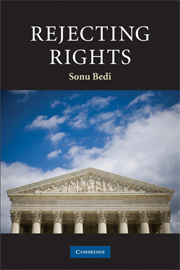4 - A theory of justification: specifying the appropriate legislative purpose
Published online by Cambridge University Press: 01 July 2009
Summary
Having outlined contemporary political theory's turn to Justification, I draw from these other accounts to propose my own, a theory that aims to better ensure and balance the values of liberty and democracy. My method of argumentation is to make my particular theory of Justification – my account of limited government – attractive through its application. Rather than arguing to my justificatory constraint – mine is not a foundational argument – I first present it constantly proving its superiority to the more conventional regime of rights.
My account of limited government turns our attention to the state's reason or rationale for acting. It reorients the way we think about limiting democratic majorities. Again, the two central questions in any theory of Justification are: what needs justifying and how is it justified? I submit that the “what” component is state action and the “how” is the minimization of demonstrable, non-consensual harm. In other words:
The democratic state may only seek to minimize (mitigate, prevent, regulate, etc.) demonstrable, non-consensual harm.
This is the only reason that the state may appeal to justify its actions. This is what it means for a democratic state to act with good reason or to act non-arbitrarily. Rather than specify activities that the state may not infringe upon (or must respect), this theory of Justification identifies the rationales that the polity must proffer to support a particular decision. I do not consider variations on this justificatory principle.
- Type
- Chapter
- Information
- Rejecting Rights , pp. 60 - 92Publisher: Cambridge University PressPrint publication year: 2009

